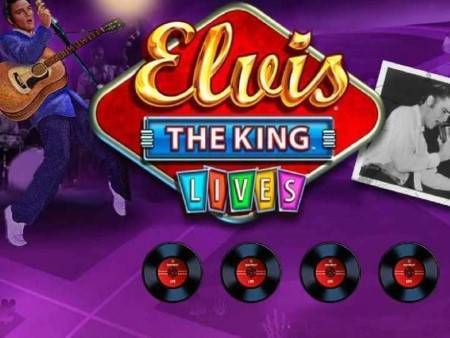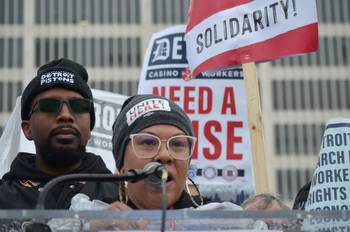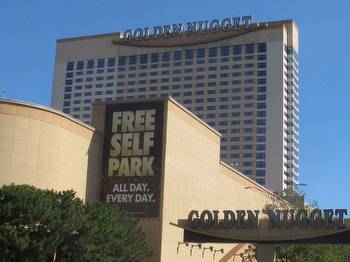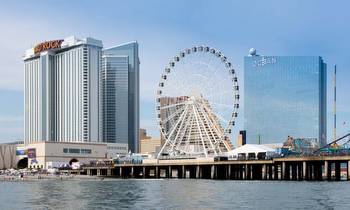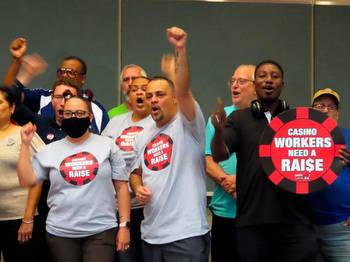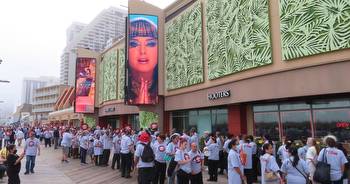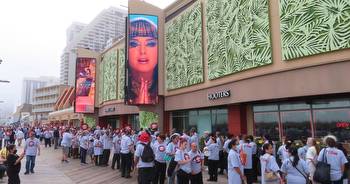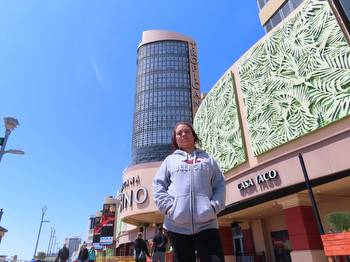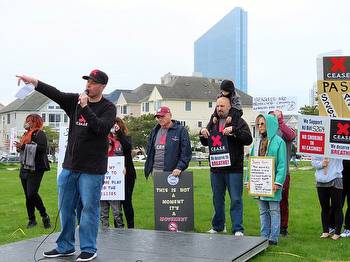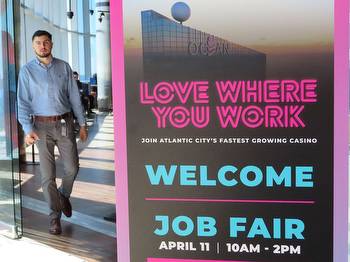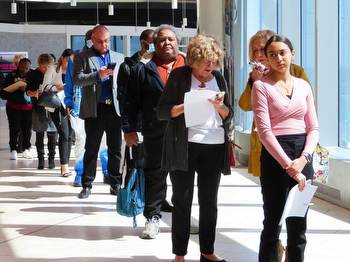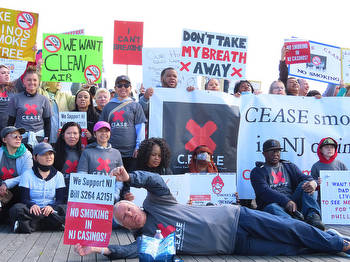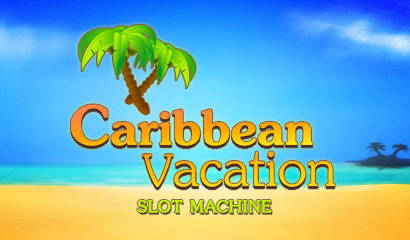A safe bet: If you want a casino job, odds are on your side


Applicants line up at a job fair at the Ocean Casino Resort in Atlantic City N.J. on April 11, 2022. Casinos across the country are trying to find additional workers as their businesses try to recover from the coronavirus pandemic, but are facing the same labor shortages as many other industries.
Friday, April 15, 2022 | 2 a.m.
ATLANTIC CITY, N.J. — As a casino dealer, Shamikah Townsend knows when the odds are in her favor.
And they definitely are right now.
While working at one Atlantic City casino last year, she went to a job fair held by a different one, and was surprised at how instantly in-demand she was when the recruiter wanted to hire her as a craps dealer.
“She said, ‘I’ll pay you to move to Florida in two weeks,'" Townsend said. “I didn't know craps, so I had to be honest and tell her, but I went out and I learned it.”
On Monday, Townsend made her move, getting hired on the spot at a job fair held by the Ocean Casino Resort in Atlantic City.
Townsend is part of a great hiring wave taking place at casinos across the nation as the gambling halls compete to add staff while recovering from the coronavirus pandemic that drove customers away and led to staff reductions.
But casinos are just one of many industries struggling to add new workers, and they find themselves competing with each other not only for casino workers, but for people with experience in the hotel, restaurant and tourism industries, to name just a few.
“Gaming is facing the same labor issues that we see across the broader economy,” said Casey Clark, senior vice president of the American Gaming Association, the casino industry's national trade group. "In our recent CEO survey, the labor shortage is a top concern across the country.
“Competition for talent is a huge impediment for growth, and we're also experiencing an expansion of gaming with customer demand increasing,” he said. “Those things are problematic when they happen together.”
That has led to some innovative tactics, including the use of virtual reality goggles at some MGM Resorts International job fairs to let applicants experience what the job will be like before signing on the dotted line.
Atlantic City's casinos are also talking with state government agencies about funding new transit options to get people to jobs at casinos from farther-out places. One possibility: something like the contract the Borgata had with a state transit agency in 2008 for a daily shuttle bus between its Atlantic City casino and Camden — an hour-long trip reaching clear across the state.
In Clark County, Nevada, home to Las Vegas, an economic development official said last month more than 40,000 jobs have gone unfilled since the state’s casinos reopened after a temporary closure in 2020. During one job fair in February, Caesars Entertainment was looking to hire 500 people.
On Friday in Las Vegas, about 6,000 people are expected to attend a jobs fair in which 105 casino and other employers will offer 13,000 jobs.
“Work is available whether you are a first-time job seeker, changing fields, newly relocated to the area or retired and wish to return to work," said Wanda Gispert, a vice president with MGM Resorts.
Nationwide, there were about 1.65 million workers employed in the gambling, amusement and recreation sectors of the U.S. economy in March, representing about 91% of the pre-pandemic workforce, Clark said. The AGA said it does not have a figure for casino employment alone.
Joe Lupo, president of Atlantic City's Hard Rock casino, is also president of the Casino Association of New Jersey. He estimates there are 2,000 full and part-time casino jobs open in Atlantic City right now, where the overall workforce of 22,000 is down from 49,000 in 2003.
“Coming out of COVID, especially last year, after the restrictions were lifted, the workforce supply just has not been available,” he said. “It's been difficult for all of us to find enough people. I certainly know after meeting with everyone last week that every property is hiring.”
That has very practical effects in casino resorts, which might not be able to open all their hotel rooms, or open all the craps or roulette tables they have. Restaurants that used to serve 700 tables a night may only be able to do 300, executives said.
As they are in other industries, workers are reaping the benefits of switching jobs, or taking a new one after being unemployed for a time. Casinos are increasing wages and benefits, and are offering to train workers without the type of experience that was once required just to get a foot in the door for an interview.
“Everybody's looking to hire the same person,” said Bill Callahan, general manager of the Ocean casino in Atlantic City. “We always need people.”
In some departments, “people that made $14 an hour a year ago might now be making $16 or $17,” Callahan said.
Ocean is starting an in-house training program to teach people how to become dealers, something most applicants had to learn on their own before, Callahan added.
The Morongo casino in Cabazon, California, has been regularly holding job fairs since December, and has at least four more scheduled for this month.
In North Carolina, the Eastern Band of Cherokee Indians said last month it needed nearly 900 additional workers for its two casinos in the state. Tribal leaders are considering recruiting workers from other countries and housing them in dormitories.
And in West Virginia, racetrack casinos told state regulators last month that a shortage of workers is preventing them from operating at full strength for a third year in a row.
Townsend, the newly hired dealer in Atlantic City, says circumstances are coming together nicely for her.
“I wanted to move up and improve my situation," she said. "These places have to compete with everybody else for workers now, and there's money to be had.”







